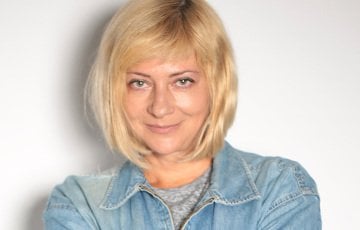Rygorych, Show Up In City
49- Iryna Khalip
- 28.03.2025, 20:03
- 39,828

The country is not a collective farm.
Another inauguration brought no surprises. Passengers waiting for the bus #100 on October Square were stretched along the street before the passing of the motorcade so that they could imitate a crowd of supporters. Petkevich wore a pink blouse. The audience in the hall was given a notebook, in which a curious mind could find 300 quotes from Lukashenka. I don't know if quotes about "filthy Frenchwomen" and "shit-covered cows" made it in—though, no matter what Lukashenka says, the same nonsense always comes out.
But one thing I've never been able to understand is his obsession with plastering his photoshopped portrait on every possible piece of paper. Those forced to attend the inauguration received "Workbook" notebooks with a large photo of the benefactor on the cover. Every first-grader in school, on September 1st, is handed a massive green book called "The President’s Gift to a First-Grader"—again, with his face on the cover. But why? If a first-grader pulls this thing out of their backpack at a bus stop or in the yard—they’ll be laughed at. If an official at a meeting pulls a "Workbook" with some random guy’s face on it out of his briefcase and starts taking notes, he’ll be laughed at too—by colleagues and comrades. They’ll snicker, take secret photos, and send them to friends, who will pass them on to journalists. No matter how you look at it, it’s just plain embarrassing. Doesn't Lukashenka get that?
Alas, he doesn’t. In three decades, he has never understood where he lives or what a country is. He still operates within the framework of a collective farm, where the chairman is king and god. The chairman decides whether a farmworker gets firewood for the winter, whether they’re allowed to use a vehicle—or at least a cart—to take their wife to the hospital, whether they can leave for the city to earn money, whether they get "freedom papers" to study at a university. The entire life of a collective farmer depends on the chairman, and Lukashenka still sees himself in that role. It’s just that he’s never known anything else, and he lacks the education—or even the cognitive ability—to grasp a different reality.
He was born under the Soviet system of serfdom when collective farmers had no passports to prevent them from fleeing to the city. They had no money either: they weren’t paid wages but worked for labor days count ("trudodni") represented by tally marks. These were compensated with grain and potatoes, and any chairman in a bad mood, or offended by a sharp word from a farmer, could cross out those tally marks and leave a family with nothing to eat. Meanwhile, a favorite of the chairman could be awarded one and a half or even two "trudodni" for a single shift in the field. Boys didn’t return to the collective farm after military service, and girls married the first passing stranger just to escape. Not from the land, not from labor—but from serfdom.
Lukashenka’s mother was one of those serfs, working "for tally marks." He barely avoided the same fate: in 1966, just before his twelfth birthday, "trudodni" were abolished. Otherwise, he too would have been sent to do compulsory farm labor—teenagers aged 12 to 16 were required to work 50 labor days a year.
But even after the ”tally” system was scrapped, the chairman's power in the collective farm remained absolute (how these chairmen were humiliated in regional party committees was something they kept to themselves like partisans). And perhaps even back then, Lukashenka formed his ultimate dream—to become a collective farm chairman. To rule with absolute power: to grant or deny permission for school graduates to leave for university, to reward the loyal with firewood and animal feed, to punish those who failed to display unwavering devotion.
The problem is that in all these years, he has never learned to think beyond the confines of a collective farm. He never grasped that a country is something entirely different. That’s what happens when a man moves from a tiny village office straight into a palace without an education, knowledge, or even a desire to acquire them.
Indeed, Lukashenka moved straight from Haradets to Drazdy and has been sitting there for nearly four decades. His residences keep multiplying, but they’re all hidden in the woods, far from the people. And in all these years, Lukashenka has never been in the city. He doesn’t know Minsk, he’s never walked through its streets, he’s never spoken to its residents. He knows nothing of Hrodna, Brest, Pinsk, or Baranovichy. To him, they are just dots on a map, populated by strangers—people he doesn’t understand, who refuse to bow before him to receive his favor, who despise him.
And maybe, just maybe, all he needed to do—thirty years ago—was to step out into the city.
Rygorych, go outside. At least see what people look like.
Iryna Khalip, exclusively for Charter97.org











